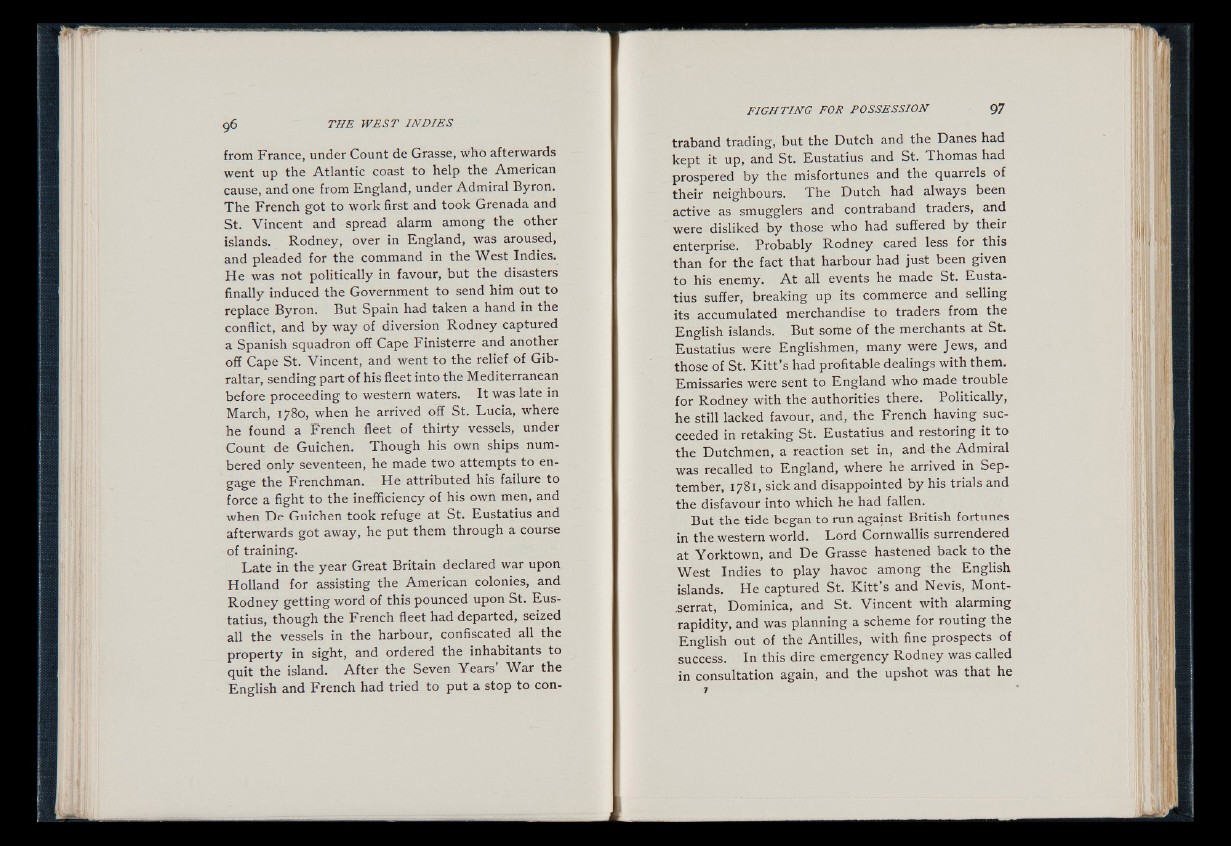
from France, under Count de Grasse, who afterwards
went up the Atlantic coast to help the American
cause, and one from England, under Admiral Byron.
T h e French got to work first and took Grenada and
St. Vincent and spread alarm among the other
islands. Rodney, over in England, was aroused,
and pleaded for the command in the West Indies.
He was not politically in favour, but the disasters
finally induced the Government to send him out to
replace Byron. But Spain had taken a hand in the
conflict, and by way of diversion Rodney captured
a Spanish squadron off Cape Finisterre and another
off Cape St. Vincent, and went to the relief of Gibraltar,
sending part of his fleet into the Mediterranean
before proceeding to western waters. I t was late in
March, 1780, when he arrived off St. Lucia, where
he found a French fleet of thirty vessels, under
Count de Guichen. Though his own ships numbered
only seventeen, he made two attempts to engage
the Frenchman. He attributed his failure to
force a fight to the inefficiency of his own men, and
when De Guichen took refuge at St. Eustatius and
afterwards got away, he put them through a course
of training.
L a te in the year Great Britain declared war upon
Holland for assisting the American colonies, and
Rodney getting word of this pounced upon St. Eustatius,
though the French fleet had departed, seized
all the vessels in the harbour, confiscated all the
property in sight, and ordered the inhabitants to
quit the island. A fte r the Seven Y e a r s ’ War the
English and French had tried to put a stop to contraband
trading, but the Dutch and the Danes had
kept it up, and St. Eustatius and St. Thomas had
prospered by the misfortunes and the quarrels of
their neighbours. T he Dutch had always been
active as smugglers and contraband traders, and
were disliked by those who had suffered by their
enterprise. Probably Rodney cared less for this
than for the fact that harbour had just been given
to his enemy. A t all events he made St. Eustatius
suffer, breaking up its commerce and selling
its accumulated merchandise to traders from the
English islands. But some of the merchants at St.
Eustatius were Englishmen, many were Jews, and
those of St. K i t t ’s had profitable dealings with them.
Emissaries were sent to England who made trouble
for Rodney with the authorities there. Politically,
he still lacked favour, and, the French having succeeded
in retaking St. Eustatius and restoring it to
the Dutchmen, a reaction set in, and the Admiral
was recalled to England, where he arrived in September,
1781, sick and disappointed by his trials and
the disfavour into which he had fallen.
But the tide began to run against British fortunes
in the western world. Lord Cornwallis surrendered
at Yorktown, and De Grasse hastened back to the
West Indies to play havoc among the English
islands. He captured St. K i t t ’s and Nevis, Montserrat,
Dominica, and St. Vincent with alarming
rapidity, and was planning a scheme for routing the
English out of the Antilles, with fine prospects of
success. In this dire emergency Rodney was called
in consultation again, and the upshot was that he